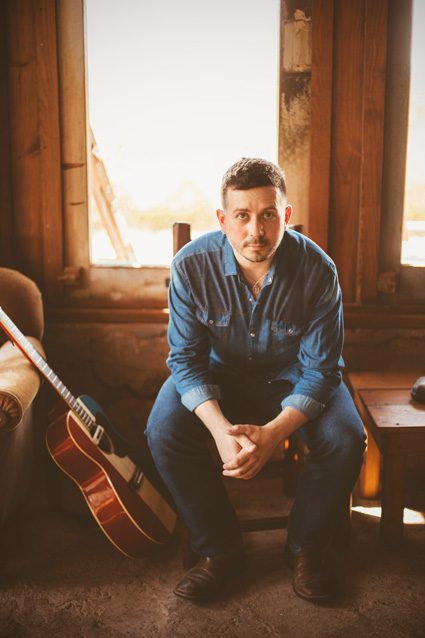
[dropcap]To[/dropcap] many musicians and music lovers, New Orleans and Kansas City mean jazz, while Memphis will forever be the home of the blues. Depending upon a person’s age and other factors, San Francisco may bring to mind psychedelic rock, Detroit the Motown sound, Seattle grunge.
Narrow the focus to our own state, and you’ll continue to find a melding of cities and styles: Tulsa with western swing and the classic ’70s Tulsa Sound, for instance, and Stillwater with Red Dirt music.
However, as Oklahoma-based singer-songwriter Jared Deck – born and raised in Thomas, now residing in Weatherford – reminds us, there’s a lot of good stuff to be found outside the recognized places.
“This record,” he says, referring to his new eponymously titled CD, “started out with me trying to tell the story of where I came from, because I think a lot of art gets lost between the metropolitan areas. There are songwriters, there are writers, there are visual artists who do amazing work, and they live in Gage, Oklahoma, or wherever and nobody sees it except a few friends. And there are stories, things that happen to people, that get forgotten.
“So my goal was to kind of bring light to all of that – and then I realized that I was just telling my own story,” he concludes with a laugh.
His own story certainly got the point across to Rolling Stone writer Marissa R. Mass, who praised Deck on the magazine’s website in March. Under the heading “10 New Country Acts You Need to Know” (another of whom was Deck’s fellow Okie Parker Millsap, from Purcell), she alluded to no less a figure than Bruce Springsteen, writing that Jared Deck “sounds like Greetings from Asbury Park, Oklahoma,” and adding, “Like the rest of his … self-titled debut, it deals not in some imagined, idealized version of fly-over country, but in the real life that lingers in towns much smaller than the dreams they contain – and, sometimes, constrain.”
Propelled by the wry, rocking single “17 Miles” – which Mass called “one of the most rowdy odes to failure ever written” – Jared Deck spent much of this summer on the Americana Music Association’s Top 40 airplay chart, exposing his songs to thousands of listeners around the world.
Although the term “ironic” gets thrown around a lot these days, maybe it’s a suitable tag for the success so far experienced by the songs on Deck’s CD, which, as Rolling Stone’s Mass implies and Deck himself confirms, have a whole lot to do with just the opposite.
“To me, the theme that comes across throughout the record is about dealing with failure,” he explains. “It’s not so much overcoming failure. I don’t want it to sound heroic. It’s just dealing with it.
“That theme,” he adds, “is coming from all different avenues. Like feeling like a failure in faith, to that expectation you feel was put on you. I was a good kid, for the most part, and I was extremely active in church, so there were those expectations that I was going to be in some spiritual role, possibly pastoral. And then, as time moved on, I realized there was no way. So I probably haven’t fulfilled what other people’s expectations were for me. I think we grow up with this idea of who we’re supposed to be, or what kind of person we want to be. It’s, ‘Man, by the time I’m this age, I’m gonna be that kind of person. I’ll be doing this, living in this other town, hanging out with these kind of people.’ And then you hit 35 and you’re like, ‘I’m not even close.’”

That sense of faded dreams, faith, and goals underpins “Grace,” one of the most affecting songs on Jared Deck.
“‘Grace’ is the first song on this new batch [for the CD] that I’d written, and I had never before written a song that honest,” he notes. “In the past, I’d cover up my true feelings with verbosity – just throw a few more words at it to kind of shield me from the outside world. But with ‘Grace,’ it felt like the paper was a mirror and I was just writing what I saw. That spurred the writing for this record.”
Another standout track, “The American Dream,” was inspired by an experience Deck had at a data-storage-tape factory in Weatherford where he was employed. Good enough to win this year’s Woody Guthrie Songwriting Contest, “The American Dream” musically explores, via a John Mellencamp-ish rocking arrangement, still another type of failure.
“We got off work at 7 a.m., 12-hour shifts, and one day as we’re going out the door they hand us notes that say, ‘Be back here at 9:30 a.m.,’” he remembers. “And when we come back for the plant-wide meeting, they announce they’re moving two-thirds of our jobs to Juarez, Mexico. Eventually, the rest of them got moved over to Japan. It didn’t take place overnight; a lot of the folks had to train their replacements. It was pretty rough.
“People talk about outsourcing a lot. You hear it on the news. But what gets left out is the feelings of the individuals who are actually there on that day, the ones who get the news. You can blame it on the company all you want – that’s the initial reaction – or blame it on the government, blame it on whatever. But at the end of the day, if you’re in that room, you feel like you’re not good enough. Even though it really had nothing to do with any of us, that was the feeling.”
And then there’s the aforementioned “17 Miles,” which deals with a failure to escape.
“When I was a kid, I thought, ‘Oh, I’m bigger than this little bitty town. I’m going to get out of here.’ And I totally blew that,” Deck notes with a chuckle. “I got 17 miles away, to the corner of Highway 54 and Davis Road outside Weatherford, and I had a flat tire. I didn’t have a spare, nobody answered the phone when I called, so I had to get a tow.” He remains to this day in Weatherford, exactly 17 miles from his hometown of Thomas.
Prior to the release of his self-titled CD, Deck had seen a reasonable amount of success as a member of bands, most recently the alt-rock outfit Green Corn Revival – he describes it as “cowpunk” – whose resume includes a high-profile engagement backing Oklahoma rockabilly legend Wanda Jackson at the 2010 SXSW Music Festival. But the visibility he’s gotten since the release of Jared Deck leads to an obvious question: How easy is it going to be to continue writing songs about dealing with failure when its opposite seems to be heading your way?
“That’s interesting,” he says. “A couple of days ago, I read a tweet from [noted singer-songwriter] Jason Isbell, where he said something like, ‘Just because you’re doing well doesn’t mean there’s not tragedy all around you.’ Actually, a lot of the songs I’ve been writing have a lot to do with tragedy, with tragic events that have either happened to me or to people I’ve known through the years. I’m not saying that the whole next album will be like that, but I think my writing has matured enough that I can talk about such things and present them in a way I feel comfortable with.
“The record gained some recognition and I’m thrilled with that. There’s been some great radio play out there. But,” he adds, “I am a malcontent by nature.”






















